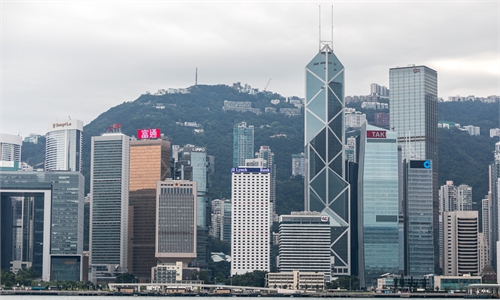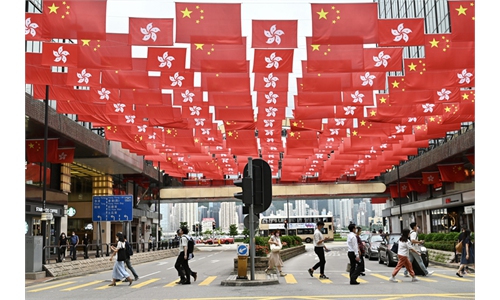HKSAR to enhance competitiveness of financial services and promote offshore yuan business: chief executive
More yuan-denominated investment tools are expected to be explored

Aerial photo taken on May 29, 2022 shows a view of the Two International Finance Centre (IFC) in south China's Hong Kong. This year marks the 25th anniversary of Hong Kong's return to the motherland.(Photo: Xinhua)
John Lee Ka-chiu, chief executive of the Hong Kong Special Administrative Region (HKSAR), pledged to comprehensively enhance the competitiveness of Hong Kong's financial services, its core industry, exploring more yuan-denominated investment tools, deeper market integration with the Chinese mainland, and easier listing rules for tech companies, in his maiden policy address on Wednesday.
These efforts will preserve Hong Kong's role as a global financial center and help it play a more prominent role as a bridge between international capital entering the mainland and domestic capital going out to the world, analysts said.
According to Lee, the HKSAR government will enhance the city's strengths as the largest offshore yuan center, which currently processes about 75 percent of offshore yuan settlements. Hong Kong will promote the launch of more yuan-denominated investment tools and the provision of stable, highly efficient treasury services such as foreign exchange, exchange rate risk and interest rate risk management tools.
Hong Kong will accelerate the implementation of mutual market access arrangements supported by the China Securities Regulatory Commission, including introducing a bill within this year to waive stamp duty for transactions by dual-counter market makers, with a view to enhancing the yuan stock trading mechanism.
The city will expeditiously complete preparations for the launch of the Northbound Trading of Swap Connect and explore enhancements to the Southbound Trading of Bond Connect. It will also continue discussions with the mainland on proposals for further expansion of mutual market access.
These measures will draw more mainland funds to Hong Kong and consolidate its position as an international offshore yuan trading hub. They will improve the liquidity and transaction activity of Hong Kong-listed stocks, Liang Haiming, dean of the Belt and Road Institute at Hainan University, told the Global Times on Wednesday.
These moves will stabilize the prices of Hong Kong-listed stocks and help the market cope with increasingly complex and volatile international financial market, which in turn will help the internationalization of the yuan and the stability of Hong Kong's financial market, Liang added.
Hong Kong will also make it easier for emerging tech companies to list their shares, Lee said.
Hong Kong Exchanges and Clearing (HKEX) will revise the Main Board Listing Rules next year to facilitate the fundraising by advanced tech enterprises that have yet to meet the profit and trading record requirements. The exchange also plans to revitalize the Growth Enterprise Market to provide small and medium-sized enterprises (SMEs) and start-ups with a more effective fund-raising platform.

The photo taken on July 13, 2022 shows the Exchange Square Complex, which houses the Hong Kong Stock Exchange, in Hong Kong, China. Photo: VCG
According to HKEX, the new rules will apply to companies specializing in next-generation information technology, advanced hardware, advanced materials, new energy, energy conservation and environmental protection, and new agricultural technologies.
Bonnie Chan, HKEX Head of Listing, said at an online press meeting on Wednesday that it is believed that the new rules will attract more high-tech companies, and HKEX has its advantages compared to other international exchanges, given its connectivity channels with the large number of investors from the Chinese mainland.
A lot of new features have been put into place when they were designing the new regime, Chan said. For instance, given that some of the companies "are still at a very early stage of their commercialization journey, it will translate to risks that potential investors have to bear" and in order to arrive at a reasonable elevation for the companies, a "slightly bigger bargaining power" will be given to investors which are more equipped and have more experiences selecting technology companies.
Relaxing the listing standards could help develop Hong Kong into an international hub for technology funding and attract more technology companies to settle in Hong Kong, Liang said.
Xi Junyang, a professor at the Shanghai University of Finance and Economics, said that after HKEX amends these rules, Hong Kong's appeal to mainland companies will further increase, including for those that are listed in the US but face a tougher regulatory environment there.
A unique advantage of Hong Kong "is its highly internationalized management regulations and financial transaction procedures, which are in line with international standards," Xi told the Global Times.
The city's proximity to the mainland makes it an ideal channel for overseas capital to enter the mainland market due to its high level of internationalization, Xi said.
On virtual assets, Lee said that the HKSAR government has introduced a bill to propose establishing a statutory licensing regime for virtual asset service providers. The Hong Kong Monetary Authority has begun preparations for issuing "e-HKD" and is collaborating with mainland institutions to expand the testing of "e-CNY" as a cross-boundary payment facility in Hong Kong.
Hong Kong will also enhance its competitiveness in fintech by encouraging more services and products to undergo proof-of-concept trials, taking forward cross-boundary fintech projects and nurturing talent in the sector. There are more than 600 fintech companies in Hong Kong.
The HKSAR government will provide a one-stop platform for enterprises to share operational data, enabling banks to make accurate assessments on the operating condition of enterprises and providing SMEs with a better chance of securing loans.



